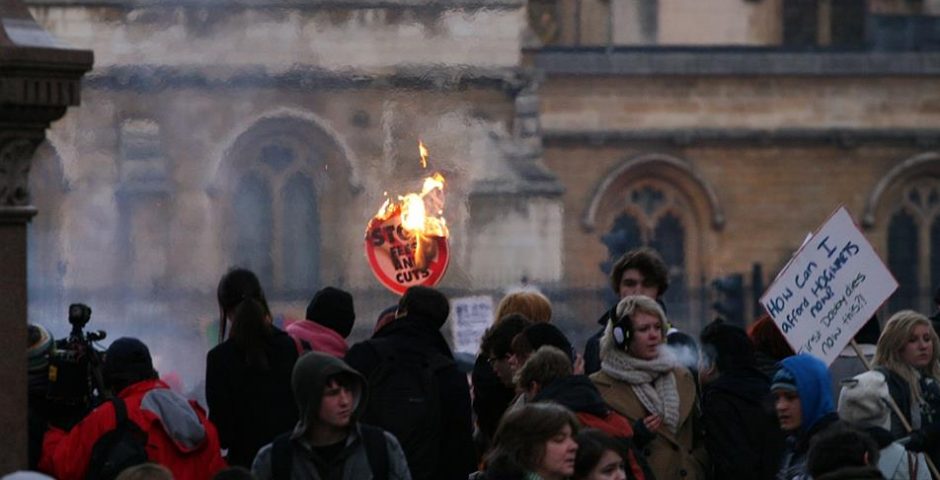
Can we all just agree that student politics is a total farce?
The NUS is an embarrassment
The biggest lie in the UK’s educational institutions today is that student politics actually matter. Whilst our pretentious SU reps are busy making diplomatic communications about their position on Brexit or taking their international solidarity stance against Israel, perhaps it is high time we realise the sheer pointlessness of their actions.
The truth is that students do not attend university to have their views on global politics represented. We attend university to learn, and in order to learn we must have our intellect challenged by a vast diversity of ideas. The rise of censorship and political correctness has restricted our educational abilities immensely.
Student Union democracy itself is a joke, and the figures for SU elections convey this clearly. At my university, Strathclyde, not even 20% of students turned out to vote at the elections at a University of over 23,000 students – and even at that only around 1,300 students actually voted for the current President, just under 6% of the university. This is the case even at university unions which claim to be far more engaged, such as at Leeds which had a turnout of 24%, Cardiff a mere 16%. Yet, despite all this, our Student Unions and the NUS have the audacity to claim that they represent the political views of the entire student population. Utterly bizarre.

The heavily criticised NUS president, Malia Bouattia
At Durham University, there is a triumphant change in demographic. The election of Tom Harwood as SU President sufficiently embarrassed our out of touch NUS and exposed the pointless nature of student politics. Ordinarily, student election campaigns are filled with pledges to take stances against Israeli forces, Trump, Brexit and many other entirely subjective opinions. Tom, however, had some policies in mind which were far more important. This included a pledge to erect a 217ft statute of our glorious NUS leader Malia Bouattia on top of Durham Cathedral. He even pledged that he would ‘defeat Isis’ and use his almighty NUS power to rid the world of nuclear weapons. The satirical nature of this campaign only showed student politics to be what it is; a downright disservice to true democracy.
On a more serious note, academia is facing a very real and threatening problem in the UK: education is being politicised. Recently, the University of Strathclyde passed a policy to censor any groups which are against abortion, claiming that their existence would violate ‘safe space’ policy. Similar situations have been seen in other institutions, such as at Cardiff Uni where there was an attempt to censor feminist Germaine Greer due to her unpopular views on transgender theory. All this censoring is a restriction on education and, frankly, a waste of resources. And the NUS has a reputation for wasting resources, particularly when half the time they are not even sure what they are meant to be protesting.

The rise of censorship and ‘safe space’ policy has turned education into a game of niceties and a disdain for controversy. Naturally, the consequence of this is that academic freedom – that is, the freedom of study and debate – is at stake. The beauty of a free democracy is that intellectual theory can be challenged and debated. Should these concepts be wrong or unpopular, they will be sufficiently exposed and ridiculed. When we are failing to do this within our educational institutions, we are putting the future of our free society at stake.
If you were a shareholder of a company, you would elect a company director on the basis that they would act in the best internal interests of the company; be that in its organisation, its events, profits, administration etc. I expect the same of a student’s union. I am quite certain that the pointless politicking of the NUS does not act in my best interests, and I do not expect my publicly funded university to be acting contrary to my interests and spending £50,000 on annual NUS membership fees, thanks.
The intention of a Student’s Association should not be to take political stances. It should rather enable students to take their own informed stances, and expose them to a diverse range of political opinion. Perhaps it is time that our student leaders stopped acting like some sort of sovereign parliament. Perhaps it is time our student leaders focussed more on organising events, balls, and academic debates, rather than poking their nose at international affairs in Europe and the Middle East.

Perhaps it is time Student Unions started acting like a Union of Students instead of creating a haven for authoritarian progressivism.
There is something quite romantic about academic freedom. University becomes an intellectual hub; a crucible of thought and an exchange of ideas. To re-establish this vision, students must start campaigning for political neutrality. Let’s end the dictatorship of the thin-skinned and chronically offended, and create a platform for open debate.


























